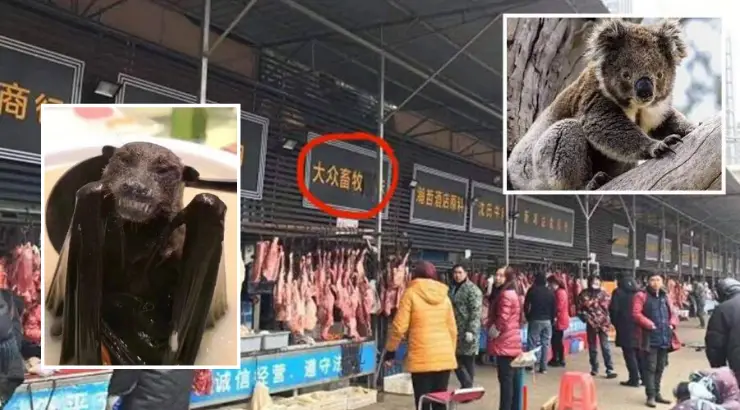Animals
Chinese Market at Center of Coronavirus Outbreak Sold Live Koalas, Snakes, Rats and Wolf Puppies
The market facing the most scrutiny allegedly sells the meat of over 100 animals.

(TMU) — As China continues to take extraordinary measures to contain the deadly coronavirus outbreak, “wet markets”—outdoor food markets selling both live and dead animals—have been labeled “ground zero” by authorities in regard to the viral epidemic.
The market facing the most scrutiny allegedly sells the meat of over 100 animals including exotic snakes, live rats, wolf puppies, live peacocks, porcupines, and even koalas, according to images circulating online.
https://twitter.com/CIAspy/status/1219857391774326784
On Wednesday, state authorities banned the trade of live animals at wet markets. The popular Huanan Seafood Market in the central city of Wuhan where the virus is believed to have begun was previously closed on January 1.
Dr. Gao Fu, the director of the Chinese agency charged with controlling and preventing diseases, confirmed that the virus—now known as the 2019 Novel Coronavirus (2019-nCoV)—likely came from “wild animals at the seafood market” but did not go into specifics. The first to suffer from the virus were reportedly the employees at the Wuhan market.
The vast outdoor marketplace is comprised of rows and rows of narrow lanes cluttered with shopkeepers, butchers, and consumers looking for the freshest cuts of uncooked meat. As Business Insider reports, people and animals—both alive and dead—are in constant contact at the market, making it far easier for the virus to spill over from animal hosts into the human population.
Relatively common animals include pigs, hares, chicken, shrimp, and dogs, but an incredible array of exotic cuts can be found including giant salamanders, crocodile tongue, and civets. Chinese consumption of civet meat was the cause of the severe acute respiratory syndrome (SARS) outbreak of 2003, according to AFP. The SARS virus, which originated with bats, was found across wildlife markets in China.
https://twitter.com/Hongkong3333333/status/1219968686418644992
One menu advertising a Wuhan market vendor boasts:
“Freshly slaughtered, frozen and delivered to your door. Wild Game Animal Husbandry for the Masses.”
While Chinese authorities have outlawed the trafficking of numerous wild species—especially since the outbreak of SARS—conservationists claim that the regulations are too loose in general but especially for species that are farmed for commercial purposes.
Exotic species are famously seen as delicacies across China and other Asian countries largely due to the legendary and often unproven medicinal benefits of eating the wild creatures. The consumption of exotic and even live animals is also seen as a symbol of social status.
https://twitter.com/Fightin49203206/status/1220301584220844034?ref_src
However, revelations of the live animal sales have even shocked many locals.
One user of Chinese social network Weibo wrote:
“Just took a closer look at the viral wild animal menu – they even eat koalas.”
While another user responded:
“There’s nothing Chinese people won’t eat.”
In a statement made on Wednesday, Dr. Christian Walzer, executive director of the U.S.-based Wildlife Conservation Society’s Health Program, said:
“Chinese scientists believe the Wuhan Coronavirus originated in wildlife sold illegally in a live animal market. This virus is closely related to SARS and it now appears the spill-over to humans followed a similar transmission path. China closed Wuhan markets where this new virus was tracked back to – but similar markets occur in other cities across China and other Asian countries.
If these markets persist, and human consumption of illegal and unregulated wildlife persists, then the public will continue to face heightened risks from emerging new viruses, potentially more lethal and the source of future pandemic spread.
Poorly regulated live animal markets, where wild animals, farmed-wildlife, and domestic animals are transported from across the regions and housed together to sell for human consumption provide ideal conditions for the emergence of new viruses that threaten human health, economic stability, and ecosystem health.”
Beijing is struggling to keep the coronavirus under control, imposing a quarantine on three cities after the virus killed 17 people and infected nearly 640.
Meanwhile, experts have warned it is “quite possible” that the deadly virus will spread to Australia.
“We do have a lot of traffic from China and I think it’s quite possible we will get some cases here but I’m very confident that we’re well prepared to respond if we do,” Australia’s Chief Medical Officer Brendan Murphy said.
Just moments ago, health authorities in Australia confirmed that a person in Sydney is under quarantine after possibly contracting the deadly coronavirus.
By Elias Marat | Creative Commons | TheMindUnleashed.com
Typos, corrections and/or news tips? Email us at Contact@TheMindUnleashed.com
